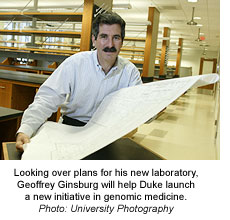|
 Genomic Medicine on the Move Genomic Medicine on the Move
By Misha Angrist
Geoffrey Ginsburg, the new director of Duke's Institute for Genome Sciences & Policy's Center for Genomic Medicine, loves to travel. In fact, he and his wife, chief of the Division of Cardiology Pam Douglas, are about to spend a month in Chile.
But as far as Ginsburg's concerned, there's travel and then there's travel. The two had a long-distance commuter marriage from 2000 to 2004, while Douglas was head of cardiovascular medicine at the University of Wisconsin-Madison, and Ginsburg served as Vice President of Molecular and Personalized Medicine at Millennium Pharmaceuticals in Boston.
"Pam and I made a commitment, which we honored, to see each other every weekend," Ginsburg said. "That was very important for us to maintain the integrity of the relationship. And we've always loved to travel. But Boston to Wisconsin once a week wasn't what we envisioned when we got married."
Relieved of his weekly jaunts to the airport, Ginsburg is free to concentrate on his new duties at Duke. The Center for Genomic Medicine will focus on research to better our understanding of how one's genome and its interaction with the environment determine health and disease. The center will also develop genome-based predictors of disease susceptibility and prognosis as well as drug benefit and safety measures. The ultimate goal is to incorporate these products into the routine practice of medicine and contribute to a more personalized approach to health care.
Ginsburg believes there's no place else so well-equipped to carry out such a mission.
"It's almost an embarrassment of riches," he said. "The medical center is so well-established and so good at so many things. It seems to me that the framework for investing in and developing genomic medicine is already in place.
"Of course, there are still challenges: training the next wave of physicians. We must also address the scientific and public policy issues. We have to be prepared to follow populations from the cradle to the grave. We have to educate patients. And we have to figure out how much it will cost and who will bear those costs."
Despite these challenges, Ginsburg sees Duke as a natural place to launch a genomic medicine initiative. He said he sees particular opportunities in treatment of cancer, cardiovascular disease and inflammation.
"I would like to see the Center for Genomic Medicine lead from Duke's strengths in these areas. With Duke's resources, we ought to be at the vanguard."
IGSP Director Huntington F. Willard is convinced that Ginsburg's expertise and novel perspective make him ideal to lead Duke's effort to shepherd the genome sciences into clinical practice. "Geoff has done it all. He's been at the heart of a major biotechnology enterprise and had extensive experience dealing with regulatory agencies and issues of health care policy. He knows the science cold. And not least, he's well aware of the human side of the equation: he has worked as a clinical cardiologist and understands that the job's not complete until we can actually use the genome to care for people. I can't imagine finding anyone with a more suitable background for this position."
Ginsburg believes that his coming to Duke stems from a lifelong interest in applied research and innovation. "Having an impact on medicine and on people's lives is the foundation that has led to this career path," he says.
During a cardiology fellowship, Ginsburg decided to take training as a molecular biologist and geneticist. He worked in a molecular cardiology laboratory at Children's Hospital in Boston.
Ginsburg went to Millennium in 1997 after being impressed by how the firm went about its business. "I became enamored with the company's ability to do science efficiently and effectively," he said. "I thought it was a company that had a very academic culture but had tremendous physical, intellectual and technological resources. It was one of those chances to explore how to do bigger and potentially better science. And from day one, there was a vision to really develop personalized medicine."
Initially, Ginsburg directed the company's program in mouse and human genetics in atherosclerosis and heart failure. Later he oversaw an alliance with Bayer AG to use genomics to identify promising drug targets to Bayer for further development. "Several years ago I began to really think about what it would take to deliver personalized medicine as a product," he said.
Ginsburg said part of the attraction to come to Duke was to be able to do things in a much shorter time. "The focus here is on the patient and not on the long term pipeline," he says. "At a company there's a five- to 10-year horizon between an idea and its fruition. Here we should be able to do things within a year's time that will have an impact on patient care."
He freely admits that not being halfway across the country from his wife was a drawing card as well. "For Pam and me to each have challenging, rich professional environments and be able to reconvene our lives together - in the same time zone and in the same house - is just fantastic."
|





